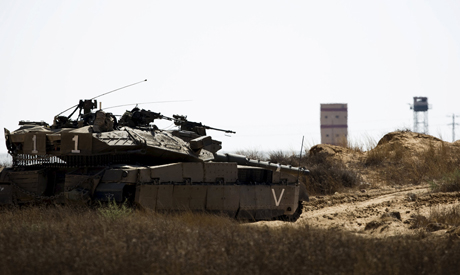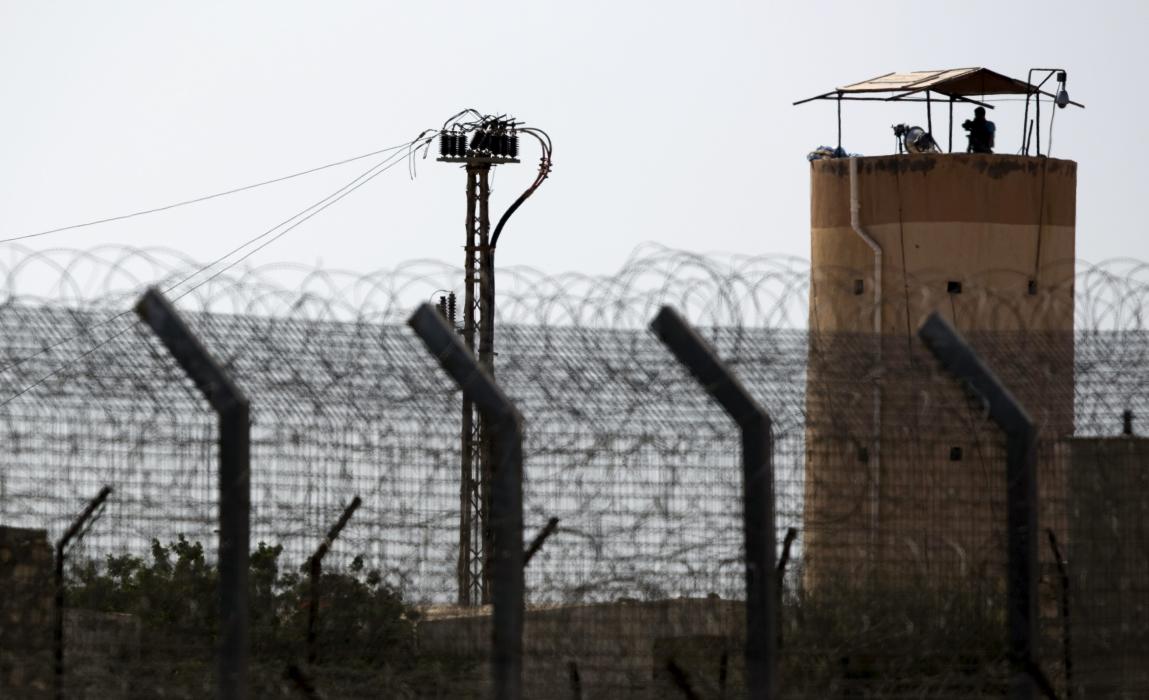Egypt Challenged
"The judiciary is restricted by laws, and swift justice is also restricted by laws. We will not wait for that. [Action will be taken within days] to enable us to execute the law, and bring justice as soon as possible."
"We will stand in the face of the whole world, and fight the whole world."
"[The Brotherhood, responsible for] issuing orders from behind bars [will see justice]. If there is a death sentence, it will be carried out."
Egyptian President Abdel-Fattah el-Sissi
 |
An Israeli army tank takes position along
Israel's border with Egypt's North Sinai (seen in background) July 1,
2015 (Photo: Reuters) Al Ahram online
|
"Those 70 who attacked the forces in Sheikh Zuweid represented the first wave of attackers. The total number of attackers throughout the day might exceed 300 elements or even more. This is a new technique that the militants have been using in their operations."Major General Hisham El-Halaby, National Defence college, Nasser Military academy
As a goodwill gesture to the Palestinians in acknowledgement of Ramadan, Israel had relaxed its vigilance at border crossings between it and the West Bank. A string of terrorist attacks since the beginning of Ramadan with Palestinians attacking Jewish Israelis and the most recent death of one young man when four Israelis were fired upon a few days ago convinced Israel that it was required that the firm border crossing rules and regulations be reinstated.
Egypt, in light of recent quiescence in northern Sinai in place of the usual attacks led by Bedouin Salafists, al-Qaeda groups with suspected Hamas involvement and the more recent incursion of Islamic State supporters, had opened its border crossing as a goodwill gesture. The relative quiet in the region had seen five new army checkpoints set up between Sheikh Zuweid and Arish, a sign of the army's success in stilling regional militant activities. As a result Gaza saw needed concrete entering for reconstruction.
Egypt, in light of recent quiescence in northern Sinai in place of the usual attacks led by Bedouin Salafists, al-Qaeda groups with suspected Hamas involvement and the more recent incursion of Islamic State supporters, had opened its border crossing as a goodwill gesture. The relative quiet in the region had seen five new army checkpoints set up between Sheikh Zuweid and Arish, a sign of the army's success in stilling regional militant activities. As a result Gaza saw needed concrete entering for reconstruction.
All that too, has suddenly changed, with Salafist attacks in the region renewed with violent vigour. Coordinated assaults in Sinai arose the day following President el-Sissi's pledge to increase the battle against Islamic terrorists two days after Egypt's state prosecutor was assassinated in Cairo. The size and intensity of the attacks emphasized advance planning by the terrorists accustomed to conflict with Egyptian security in northern Sinai whose insurgency increased with the removal of the Muslim Brotherhood's Morsi from the presidency.
The incitement to violence by the Brotherhood had not gone unnoticed by the government of Egypt. Which has responded by investing greater resources into countering the prolonged insurgency. Islamic State-linked Ansar Bayt al-Maqdis terrorists have claimed that Wednesday's attacks in the Sinai was their initiative. Its fighters attacked 15 army and police positions, staging three suicide bombings, two of them targeting checkpoints, one hitting an officers' club in el-Arish.
According to Egyptian officials the attackers made use of mortars, rocket-propelled grenades and assault rifles. Two checkpoints in close proximity to one another were destroyed completely. President Abdel-Fattah el-Sissi's Tuesday vow to commit increasingly to the two-year crackdown on the terrorists in the wake of Hisham Barakat's assassination obviously triggered this response in defiance of the country's will to defend itself from violent Islamist aspirations.
The Egyptian army death toll has been put as high as 60 when 70 militants attacked the five checkpoints, with Egyptian troops killing 22 and destroying three all-terrain vehicles fitted with antiaircraft batteries. Egyptian security forces have been successfully attacked in a series of complex manoeuvres over the past two years; many of those attacks have been claimed by a local affiliate of the Islamic State group now calling itself the Province of Sinai, having sworn allegiance to the Islamic State.
Ahram Online reported through sources that the total number of Egyptian army soldier fatalities may rise above 70, with counter-attacks by the military against the ISIL group now leaving 90 militants dead by late Wednesday afternoon. According to a security source reported by Sky news Al Arabiya, 50 of the militants died in an airstrike that struck their North Sinai sites.
 |
| A member of Egypt's security forces stands on a watchtower in North Sinai as seen from across the border in southern Israel July 1, 2015. Islamic State militants launched a wide-scale coordinated assault on several military checkpoints in North Sinai on Wednesday in which 50 people were killed, security sources said, the largest attack yet in the insurgency-hit province. Egyptian army F-16 jets and Apache helicopters strafed the region that lies within the Sinai Peninsula, a strategic area located between Israel, the Gaza Strip and the Suez Canal. (REUTERS/Amir Cohen) |
Labels: Conflict, Egypt, Islamic State, Muslim Brotherhood, Sinai

<< Home